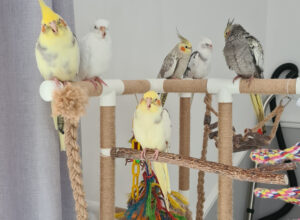Managing Cockatiel Noises and Sounds
Key Takeaways
- Understanding and managing cockatiel sounds for a harmonious relationship.
- Importance of environment and daily care in influencing cockatiel behaviour.
- Recognising the difference between normal and concerning noises.
- Practical tips for reducing unwanted noises.
Over the years, I’ve learned that living with these delightful birds is a symphony of sounds (that’s one way of putting it!). From cheerful chirps to emphatic squawks, understanding and managing these sounds is key to a happy coexistence. This article delves into the world of cockatiel noises, offering insights and practical advice for fellow cockatiel owners.
Understanding Cockatiel Noises
Cockatiels communicate through a variety of sounds, each with its own meaning. Recognising these can greatly enhance your understanding and bond with your feathered friend.
Cockatiel Sounds and Their Meanings
| Sound | Meaning |
|---|---|
| Whistle | Happiness or attention-seeking |
| Chirp | Contentment, comfort |
| Hiss | Fear, discomfort |
| Scream | Excitement, stress, or seeking attention |
Environmental Influence
The environment plays a crucial role in the behaviour of cockatiels, including their vocalisations. A well-set-up cage in a suitable location can significantly impact their well-being. For more on this, explore setting up a cockatiel cage.
Managing Cockatiel Noises
Positive Reinforcement
Rewarding quiet behaviour and ignoring excessive noise can encourage your cockatiel to be less noisy. Patience and consistency are key.
Identifying the Cause
Understanding why your cockatiel is making noise is crucial. Addressing their needs can help in reducing unwanted sounds.
Strategies for Managing Different Noises
| Noise Type | Management Strategy |
|---|---|
| Attention-Seeking Screams | Provide attention when quiet, ignore when noisy |
| Boredom-Related Noises | Introduce new toys and activities |
| Stress-Induced Sounds | Ensure a safe and comfortable environment |
When to Be Concerned
Some sounds may indicate distress or health issues. Continuous screaming or a sudden change in vocalisation warrants closer attention and possibly a visit to the vet. Understanding cockatiel illnesses is crucial.
Daily Cockatiel Care and Noise Management
Effective noise management is intertwined with daily care routines. Ensuring your cockatiel is well-fed, has clean water, and a clean cage can prevent many issues related to stress and discomfort. For more on daily care, see daily cockatiel care.
The Role of Diet and Hydration
A balanced diet and proper hydration are essential for a healthy cockatiel. Nutritional deficiencies can lead to stress and increased vocalisation. Learn more about cockatiel feeding basics and hydration needs.
Exercise and Play
Physical activity and mental stimulation play a significant role in managing cockatiel noises. Regular playtime and exercise can prevent boredom and the associated excessive noise. Discover the benefits of cockatiel exercise and play.
Grooming and Moulting
Grooming and dealing with moulting can be stressful for cockatiels, often leading to increased vocalisation. Proper grooming care and understanding the moulting process can help mitigate this. For grooming tips, visit cockatiel grooming essentials.
Seasonal Changes
Cockatiels can be sensitive to seasonal changes, which can affect their behaviour and noise levels. Understanding and adapting to these changes is important for their well-being. For more, see seasonal cockatiel care.
Conclusion
Managing cockatiel noises is a blend of understanding, patience, and proper care. By addressing their environmental, dietary, and emotional needs, you can ensure a harmonious relationship filled with delightful chirps rather than distressing screams. Remember, each cockatiel is unique, and what works for one may not work for another. The journey of understanding and adapting to your cockatiel’s vocalisations is a rewarding part of the bond you share with your feathered companion.

